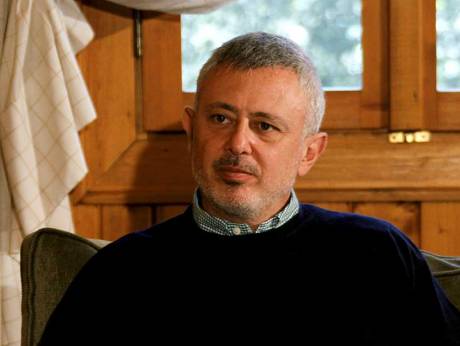
by Joseph A. Kechichian, Senior Writer Gulf news
Beirut: As anticipated by Al Nahar newspaper a few days ago, the leader of the Marada Movement, deputy Sulaiman Franjieh, formally announced his candidacy for the position of president of the republic on Thursday evening during a scheduled interview on “Kalam Al NAS with Marcel Ganem” on the LBCI channel.
The interview, drew praise from the Progressive Socialist Party leader Walid Jumblatt.
Jumblatt praised the interviewee, opining that Franjieh was “realistic” and wrote on his Twitter account: “His interview was frank and steered away from the empty political slogans of some officials.”
Friday morning commentators in various newspapers were evenly divided, some dismissing Franjieh’s “practical approach” to bring opposing forces together as little more than entertainment, while others saw merit in his efforts to lift the obstruction that prevented presidential elections.
The Marada leader refer to his longtime ally and designated March 8 candidate, Michel Aoun. “I leave an opportunity for General Aoun [to reach the presidency], but I am a candidate too, yes. I am present,” Franjieh insisted, though his “I consider myself and Aoun as one in this plan”. In fact, he revealed that while he spoke with Hezbollah leader Hassan Nasrallah and Speaker Nabih Berri that he would meet with Hariri in Paris, he chose not to inform Aoun, which spoke volumes. He did not know, or did not share any insights if he did, as to whether Nasrallah or any other Hezbollah official, or Berri or any Amal Party representative informed Aoun of the trip and the discussions with Hariri.
Aoun, more than anyone else, was livid when he heard the news not only because he insisted the presidency was his, but also because he sensed the March 8 alliance was ready to work around him. Recent Hezbollah affirmations that Aoun remained the group’s sole contender failed to appease the general while Franjieh’s determination to pursue a presidential bid angered him as well. It was remarkable that Aoun has not uttered a single word in public ever since Franjieh’s availability was floated.
Throughout the interview, Franjieh insisted he was not competing with Aoun, but that his candidacy offered a fresh opportunity to bring the presidential crisis to an end although commentators were unanimous that tensions between the two men ran high.
In the haste to settle the presidential deadlock, few provided insights on Franjieh’s policies, especially his openly pro-Syrian preferences, even if the candidate affirmed that his “history is known.” He insisted he would not serve as a puppet for the March 14 movement and that he might well oppose policies espoused by the alliance. He provided the example of the latest Saudi anti-terror coalition and confirmed that he would oppose it. “I say that Saudi Arabia is backing terrorists [in Syria] that Hezbollah is fighting. How can I be with them (Saudi Arabia)?” he intoned.
When Ganem asked about Franjieh’s presidential platform, one word was uttered: “electricity.” “I no longer want to dream of Lebanon in a political [way.] I want to dream of Lebanon with 24/7 electricity. If I want to build a house, I don’t want to have to worry about hooking up [battery backup systems] and electricity generators …,” he said. The reference to 24/7 electricity targeted Foreign Minister Jibran Basil, Aoun’s son-in-law, who repeatedly promised full power when he was in change of that sector though conditions worsened. The avowal and the remedy were indicative of what preoccupied Lebanese elites, which avoided fundamental constitutional challenges between various groups that rejected and delegitimized each other, with no signs of any meaningful changes in the foreseeable future.



